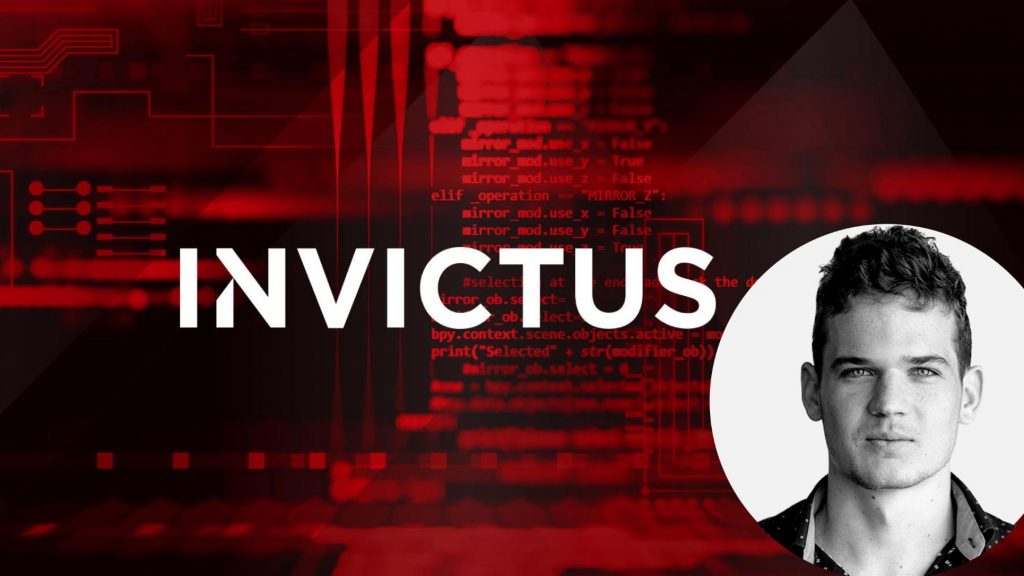LG’s 100-Inch QNED evo AI TV Redefines Big-Screen Viewing in South Africa In a bold leap forward for home entertainment, LG Electronics South Africa…
Friday interview: Matthew Finlayson, Invictus Capital co-founder

Scan the About page of the Invictus Capital website and you’ll read about how the company is a pioneer in the blockchain space, and how it believes in the technology’s ability to radically transform the future of asset management. VentureBurn spent some time with co-founder Matthew Finlayson to find out how the firm transformed from platform start-up to business incubator – and what he thinks the critical skills are for the blockchain revolution.
In my belief all financial transactions will be done on the blockchain in the future.
Do you still refer to Invictus as a start-up? How do businesses mature as a company?
“A start-up is more about the culture of the company, you’re more likely to be innovators. What you’re working on now versus six months from now can be very different, whereas most corporate business is about keeping the ship going or just maintenance. At start-ups it’s about building.”
“As long as you’re building and have a culture of innovation and are starting new stuff, I would still classify it as a start-up – and Invictus can still be classified as a start-up. Everything we’re doing is still evolving and developing. We’re at the cutting edge of what’s happening.”
What was the lightbulb moment for Invictus?
“It all started with the first fund. The gap we saw was in the huge interest and hype around the crypto markets in 2017. There was no easy way to get in, so we took the index fund model from traditional finance and, using blockchain tech, we exposed the fund to crypto assets. It was an easy way to gain access to the crypto market, whereas in the past you had to pick and choose what you wanted to buy. The company evolved from that to asset management, and we got a trading team.”
Besides for the crypto hysteria, what makes the sector so exciting? Surely the Bitcoin price speculation isn’t sustainable?
“The crypto space is really cool because it’s the intersection of so many different areas. Everything from economics to pure finance and trading, whatever you want.”
How has Invictus remained relevant in this fast-moving industry?
“I think as a company we’ve always been opportunistic, looking at the overall industry and we think it will only grow in the future. We have four main arms of the business at the moment.”
- One arm is asset management where the focus is on getting institutional investors access to crypto.
- The trading side that is growing rapidly, I think we interviewed 400 candidates this past month, and that’s all-prop trading and NFTs.
- Protocols is where we run our VC fund and an incubator arm underneath that where we develop protocols on blockchain tech.
- We have an NFT Lab where southern African artists are collaborating to launch NFTs. It’s a very complementary business that creates almost like a very new age, crypto focused bank with various branches and divisions inside it.
That’s cool, but it sounds like a regular company. How is Invictus leveraging Blockchain technology?
“Our funds on the asset management side are all represented by smart contracts. What would be traditionally the share register is essentially tokens which represent units of the fund. For us that’s of huge benefit. A lot of traditional finance is terribly slow, especially on the asset management side because of all the data that needs to be shared between the intermediaries and it’s not digitally native.”
“Using a smart contract, and this is only one of the functions that using blockchain technology enables, has huge efficiency and UX improvement. The result is not that different from what you would get at a traditional company. Remittance is possible with traditional finance, or you can remit with Bitcoin – those are the same kinds of transactions, but the way they work is very different.”
Most people are looking at the Bitcoin price and asking about which exchange they should use, but I think it’s really missing the point if that’s all you’re looking at.
Exciting. What are some of the skills needed for this fresh style of finance?
“In terms of the skills required, I think the learning curve in the crypto space is quite steep. We have lots of people that come from technical backgrounds and come from traditional finance, and they are just blown away by how much innovation is happening in the blockchain universe. The first things you need to learn is how, at a high level the blockchain works, and then more specifically you’d learn how a crypto wallet relates to the crypto network, how does private key storage work and what is ownership in Ethereum.”
“If you go into the programming side, then you’d have to learn one of the blockchain languages like Solidity if you wanted to build contracts and build blockchain applications. It’s important to note that there’s also a very traditional stack like we have a Python backend and react front end. Just part of the tech stack is blockchain technology. But the progression, at least in my mind, is first learning blockchain, then wallets, and then contracts.”
Is there hope for current finance professionals to make the switch? Can stock traders convert their existing skills one-to-one, for instance?
“There’s a lot of interest in trading from traditional traders in the cryptoverse, but it definitely isn’t a one-to-one for two main reasons:
- The way crypto markets work is very different. If you want to trade on the JSE you usually must go through a broker or brokerage, whereas in the crypto market you get direct access to the exchange itself. You can just log on and make an account on Binance or something like that and have direct access to all the information even a sophisticated trader will seek. You can compete as an individual.
- It also moves so fast that there are new financial products launched on a weekly basis. Even the types of contracts that exist or the types of things you can trade on exchanges are new and novel. You can’t use your previous knowledge; you’ll have to adapt your understanding.
“And the same is true for the DeFi (decentralised finance) world with Ethereum and Solana. The way that those work is completely different from traditional finance. So the opportunities are far greater in the crypto space, but the the knowledge required is meaningfully different from the way that equities and stocks function in the traditional markets.”
So, what should aspiring start-ups and crypto enthusiasts know about the cryptoverse to be successful?
“I think the core thing that’s different from the discussion about crypto assets is really the underlying technology around how Ethereum works, for instance, is interesting and super useful for several industries. Most people are looking at the Bitcoin price and asking about which exchange they should use, but I think it’s really missing the point if that’s all you’re looking at.”
“What I think people should be looking at is how blockchain technology works. I think the space we’re in right now is similar to when the internet was first created. It’s exceedingly difficult to predict the future, but you can see that there’s this very disruptive force on the horizon. We see in our business that blockchain technology, especially in finance, is going to be very disruptive.”


